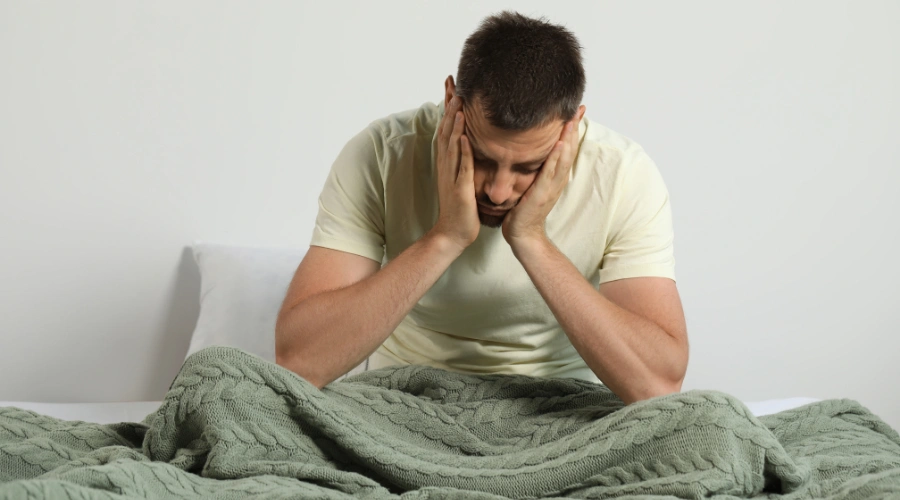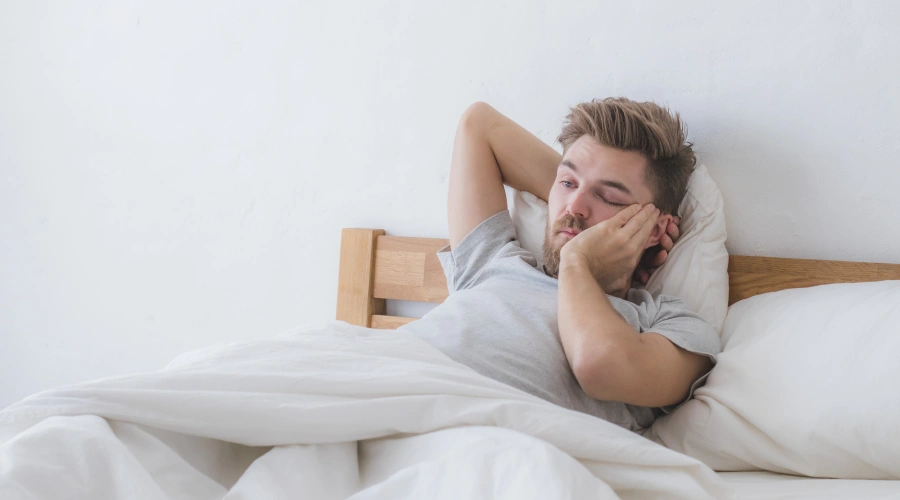How Drug Use Can Lead to Bags Under the Eyes and Getting Help
If you wake up in the morning and notice the appearance of dark circles or puffiness under the eyes, you might wonder what happened. Lifestyle factors can contribute to their appearance, but that isn’t the only thing causing your periorbital puffiness.
So, let’s get to the details on your burning question: What drugs cause bags under eyes?
Some of the drugs that cause bags under the eyes include stimulant drugs, alcohol, antihistamines, antidepressants, and chronic use of NSAIDs. These drugs can disrupt normal sleep patterns, lead to more fluid retention, and impact the blood vessels around the eye, all of which affect appearance.
In addition, lifestyle factors like allergic reactions, stress, and increased blood pressure also contribute.
South Shores Recovery can help you take the first steps toward sobriety and recovery from drug use that causes under-eye bags. Our proven programs will address the root cause of under-eye bags and help you forge a new path. Keep reading to learn which drugs can impact the appearance of under-eye bags.
How Drug Use Leads to Eye Bags and Why It Matters

Dark circles under the eyes can be extremely difficult to cover up without an expert touch with makeup. This simple condition of bags under the eyes can make you look tired or older than you are in reality.
But why does drug addiction and substance abuse lead to these under-eye bags?
The truth is that it depends on the drug itself, whether that means alcohol consumption or prescription medications. It could be caused by fluid retention or a disruption of your normal sleep patterns. Here is a closer look at which substances cause dark circles and puffiness and why.
Common Stimulant Drugs Disrupt Sleep Patterns and More
Stimulant drugs have a serious impact on your physical health, even if you’re taking them as prescribed by a healthcare professional for your mental well-being. Prescription drugs and street drugs that fall into this category (like amphetamines, cocaine, and others) disrupt sleep patterns, especially if you take them for prolonged periods.
Not getting enough sleep leads to fluid retention in the body and can increase inflammation as well. For both of these reasons, poor quality sleep leads to a greater likelihood of under-eye bags.
However, that’s not the only way that prescription drugs can cause issues with dark circles. They impact the central nervous system and lead to increased blood flow. The blood vessels under the eyes become dilated and can then appear even darker than usual.
Alcohol Consumption and Dehydration Can Cause a Fatigued Appearance
It isn’t always illegal drug use that causes bags under the eyes. Alcohol consumption, especially if you drink regularly, can also lead to this aged appearance. When you drink alcohol, you often don’t drink enough water, and the alcohol itself contributes to dehydration.
How does this lead to bags under the eyes?
Dehydration causes the skin to look loose and flabby. Weakened skin can bunch up in sensitive areas such as under the eyes. This causes the appearance of under-eye bags because it contributes to the puffiness of sensitive skin. This puffiness is going to be harder to cover than just plain dark circles.
Antihistamines to Manage Allergy Symptoms

Did you know that the circles under your eyes can actually be caused by natural processes in the body?
An allergic reaction and other medical conditions can lead to bags under the eyes through fluid buildup in the body and even through common swelling.
Medical conditions like this often lead to swollen eyes, but they are counteracted by antihistamines.
It doesn’t matter whether your allergy symptoms are brought on by pet hair, pollen, dust, or even a serious allergy to something you consume. You can get bags under the eyes under control simply by avoiding interactions with the allergens that affect you most. In this case, a healthcare professional may be able to help with allergy meds.
Antidepressants for Mental Health Issues and Other Factors
Sometimes, it may be necessary for you to take prescription drugs to combat serious mental health issues like depression and anxiety. Unfortunately, some medication regimens can alter your physical appearance and lead to under-eye bags. While they may make you feel better, you’ll have to learn to cope with the physical symptoms.
It’s not entirely understood why antidepressants cause periorbital puffiness, but there are some initial thoughts. First, these prescription medications could cause fluid retention and lead to your under-eye swelling and puffiness. If this is the case, there may be little you can do to counteract them.
However, they can also lead to blood vessel dilation and can stimulate blood flow to this sensitive area. The delicate tissues under your eyes are more likely to show under-eye puffiness and dark circles due to this side effect compared to other parts of the body.
Non-Steroidal Anti-Inflammatory Drugs for Medical Conditions
While a single dose of an NSAID for a medical condition like a headache or body pains might not be enough to give you under-eye swelling, consistent use of certain drugs in this category impacts your skin health and your under-eye area in particular.
Why does something so benign cause dark circles?
It’s most often caused by an issue with fluid balance. Ibuprofen and aspirin both inhibit prostaglandin production, which can lead to fluid retention. You’ll find that non-steroidal anti-inflammatory drugs cause your body to hold onto more fluids than usual, and these extra fluids become that much more prominent in the sensitive areas under the eyes.
If you’re experiencing under-eye bags and have been using NSAIDs regularly, it may be worth talking to your doctor about other long-term medications that manage pain without this side effect.
Getting Control of Under-Eye Bags with Lifestyle Factors

It’s worth noting that bags under the eyes can also be caused by lifestyle factors apart from substance abuse. Getting control of your overall health can put you on the path to healing. These lifestyle factors can contribute to under-eye bags and can be easier to manage.
Unhealthy Sleep Patterns and Dark Circles
Sleep deprivation can cause those same dark circles and periorbital puffiness, and this can be managed with good sleep patterns and medication.
Drugs that impact alertness and energy levels can also lead to sleep disruption. Protect your sleep, and you might find that your dark circles disappear.
Increased Blood Pressure
Increased blood pressure can also lead to these dark circles. If you have unusually high blood pressure, you may see damage to the individual blood vessels over time.
This affects sensitive areas such as the eyes, leading to leakage. As blood flow leaks out of the vessels where it belongs, you will see prominent dark circles under the eyes.
Chronic Stress
Another issue that might require appropriate treatment is an issue with chronic stress. Your healthcare provider might note that you could benefit from prescription drugs or a lifestyle change to get the under-eye area under control.
Stress can constrict blood vessels and make them more visible under the eyes. The result is increased prominence of dark circles, especially if stress causes insufficient sleep.
Allergic Reactions
If your under-eye bags aren’t caused by the natural aging process, you might want to explore whether other medical conditions are contributing. Allergic reactions are one of the most common issues that lead to puffy eyes. They’ll cause the nasal passages to swell and lead to swelling and puffiness of the eyes as well.
Cold compresses may help in this situation, or you can do detective work to find alternative treatment options. Antihistamines may help in the short term with discomfort.
Get Support for a Sober Life at South Shores Recovery

Not everyone who has under-eye bags will need help for a substance abuse issue, but you might want to consider it if your alcohol or drug use is causing fatigue and appearance issues.
We offer robust treatment options that target poor nutrition, inadequate rest, and all of the other medical conditions that could contribute to under-eye bags.
Our Admissions team can answer your questions about our treatment program, with options ranging from residential care to outpatient care.
Let us verify your insurance benefits in a quick, confidential call so that you can reserve your spot in one of our treatment programs today!
References
- Stein, M. A., Weiss, M., & Hlavaty, L. (2012). ADHD treatments, sleep, and sleep problems: complex associations. Neurotherapeutics : the journal of the American Society for Experimental NeuroTherapeutics, 9(3), 509–517.
- Schrantee, A., Bouziane, C., Bron, E. E., Klein, S., Bottelier, M. A., Kooij, J. J. S., Rombouts, S. A. R. B., & Reneman, L. (2018). Long-term effects of stimulant exposure on cerebral blood flow response to methylphenidate and behavior in attention-deficit hyperactivity disorder. Brain imaging and behavior, 12(2), 402–410.
- Irwin, C., Leveritt, M., Shum, D., & Desbrow, B. (2013). The effects of dehydration, moderate alcohol consumption, and rehydration on cognitive functions. Alcohol (Fayetteville, N.Y.), 47(3), 203–213.
- Farzam K, Sabir S, O’Rourke MC. Antihistamines. [Updated 2023 Jul 10]. In: StatPearls [Internet]. Treasure Island (FL): StatPearls Publishing; 2025 Jan-. Available from:
- Joseph, J. T., Vishwanath, R., & Praharaj, S. K. (2023). Peripheral edema associated with antidepressant use: Systematic review of case reports. Human psychopharmacology, 38(6), e2884.
- Joseph, J. T., Vishwanath, R., & Praharaj, S. K. (2023). Peripheral edema associated with antidepressant use: Systematic review of case reports. Human psychopharmacology, 38(6), e2884.


Recent Comments